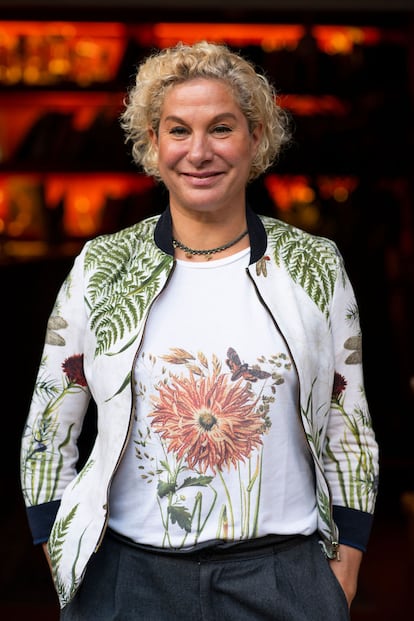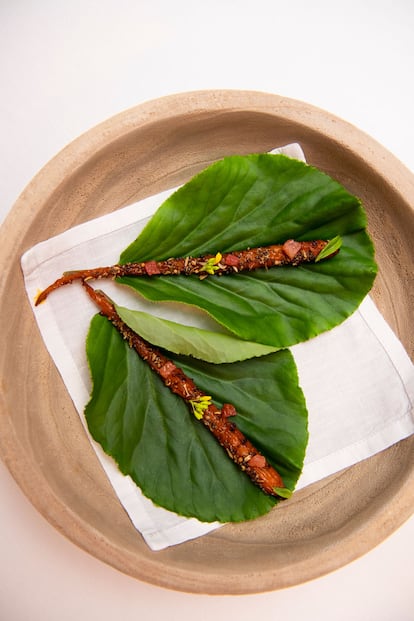Ana Roš: ‘I had an eating disorder when I was a teenager. That’s why I take the utmost care in what I eat and cook’
She is one of Europe’s top chefs and a standard bearer for green cuisine. She advises the Slovenian government on sustainable policies and has set up new restaurants in Ljubljana and Istria

“I use meat as a spice, as an essence in the background, to support the flavor. The base of my cuisine is vegetables,” says Ana Roš. The chef is the ambassador of Slovenian cuisine and has long been challenging mountain meat diets with green proposals, in the alpine valley of Soča, the site of her two Michelin star restaurant Hiša Franko, which is ranked 34th on The World’s 50 Best restaurants list. Her Reincarnation menu, which can be paired with natural wines, kombuchas or juices, is delicious, tasty and light.
“Diners tell me they enjoy themselves and don’t feel full. I think the lightness of the tasting menus is necessary. I worry about how people will feel when they eat my dishes and digest them. I am very sensitive to this,” the 50-year-old self-taught professional assures us. She can express herself in seven languages and has reached the top of the gastronomic elite: she was voted the world’s best chef in 2017.
“My restaurant reflects the way I like to eat. When my daughter told me two years ago that she had decided to become a vegan, my son replied ‘Oh my God, now we won’t eat meat at home.’ I replied, ‘You’ve been eating vegetarian and you haven’t even noticed. Because I hardly cook meat at home, I only cook vegetables with a little cheese or oil,” she says.

So in Roš's crusade for green cuisine she is accompanied by the twentysomethings Eva Klara, who works in Hiša Franko’s dining room, and Svit, a student at the Italian Slow Food University of Gastronomic Sciences. They are the two children she had with Valter Kramar, her ex-husband, who led her to discover a passion for cooking at the family hotel-restaurant Hiša Franko (now celebrating its 50th anniversary) while she was an Olympic athlete studying to become a diplomat.
Ana Roš remarried at the start of 2023 and is a green standard bearer right down to the tablecloths and uniforms of the Hiša Franko team. Created together with designer Matea Benedetti, they are made of organic cotton and feature floral motifs. She and the staff glide through the restaurant as if in a dance with fragments of the surrounding landscape.
The greenery also reaches her growing orbit of restaurants. Roš is now in overdrive, multiplying her eateries. She is building a team for a restaurant in an enclave in Istria, on the Adriatic coast. In the Slovenian capital, Ljubljiana, her Pekarna Ana bakery has been a hit. It offers sourdough breads and handmade pastries with different cereals, fruits and nuts from the country. “Everything is Slovenian based,” she boasts.
This local line, with an informal, cosmopolitan touch, is central to the spring menu that she displays in Ana in Slon, a pop-up restaurant in the center of Ljubljana while the works of what will be a bistro in the summer are being finished. “An informal space based on farm and country life: local, seasonal and sustainable. I want it to be a place that you always want to come back to,” she says about the venue, which will be called Ana. “Everything is Ana, like when my daughter called all her dolls Ana when she was little,” says the chef, who has become a national icon.
Ana Roš has energized Slovenia’s cuisine. In the last decade, the notoriety of the country’s chefs has grown. “I don’t want to play the princess of the kingdom,” she says. “I’m humble, I’ve just been working hard for years and enjoy cooking. I recognize that I am very active, that I go on many adventures and have a lot of media exposure. But there are many good professionals and new generations that are coming on strong in Slovenia. Cooks who follow an excellent path with their own gardens and even raise their own animals, who make their own bread, cheese, and butter. I think we are creating a very interesting community.”
The Slovenian chef — whose alpine paradise achieved international impact in a Netflix documentary, Chef’s Table — has more collective goals. She has relied on the cooperation of producers from her native Soča Valley for years. She has a vegetable garden, cows and trout that she keeps in a pool connected to the stream that runs next to Hiša Franko. “My dream is to create a network of biodynamic producers in the region. We are making a map of abandoned vegetable gardens so as to recover them, and I want to make a platform where chefs, customers, and everyone can buy vegetables and know exactly where they come from. Why eat Chinese mushrooms planted here in a greenhouse when you can grow native mushrooms? Why not produce enough vegetables to feed eight million people?”

It is precisely because of this line of healthy nutrition that she follows, that Roš has been hired as an advisor to the Slovenian government to develop food plans, similar to the collaboration with chef José Andrés that Barack and Michelle Obama established in the White House. Green cuisine, organic production and healthy living habits are matters of state in Slovenia. “We want to be the most sustainable country in the world,” proclaimed Prime Minister Robert Golob at the European Food Summit, a congress on responsible consumption organized in Ljubljana at the end of last year by the country’s most media-friendly chef. There, an appeal to common sense, the Common Sensitarian Diet Manifesto, was launched as a guide to good practices that will permeate global food culture. Scientists and doctors, as well as professionals from the culinary sector and the co-founders of the congress, together with Hiša Franko’s chef, food critic and creator of such events as Gelinaz, Andrea Petrini and nutrition and sustainable food specialist Afton Halloran participated in its development.
“My daughter, who is a vegetarian, is pushing me when it comes to making decisions,” the Slovenian leader told EL PAÍS. “It would be useful for other politicians in Europe and around the world to sit down and discuss how to address sustainable production and consumption practices with a real intention to improve food. We need fewer words and more action,” says the chef vehemently, in her role as the United Nations World Tourism Organization for Gastronomy and Wine Tourism ambassador. She has also embarked on sustainability campaigns such as the Basque Bermeo Tuna Forum. “I am an advocate of any agreement that means protecting our seas. Everything possible must be done to ensure that the tuna is not overexploited,” she says.
“For me, common sense in food is to maintain a nutritional balance and try to eat in a varied and healthy way,” says Ana Roš. “We eat too much processed food and you have to use fresh food. When I was a teenager I had an eating disorder. That affected me a lot and that’s why I’m very careful about what I eat and cook. And this includes the commitment to a diet based heavily on fruits, vegetables, and legumes. “I believe in healthy food and a vegetable diet, but we also have to take care of these vegetables, because if they are treated with chemicals we already have a problem. How do we grow organic food for millions of people? And how do we encourage a plant-based diet in a country where the meat industry is very strong, and consumers are carnivores? It is a problem. There are big lobbies, and it is difficult to change the situation from one day to the next, but I am optimistic. We must not give up and we must try to make good food with fresh products (plenty of fruits, vegetables, and legumes) a political issue. Agricultural policy must be transformed and what the different regions have to offer must be well managed. Changes must be brought about. We chefs can influence the way we work, but we need large-scale initiatives.”
“Chefs are like rock stars now. But in addition to enjoying the fame we have to make a commitment: to be a platform to highlight problems, not only in the food and hospitality industries, but also in people’s daily lives. It is not a utopian dream to want to make a better world,” adds the chef.
And the Ana Roš effect has also meant a constellation of Michelin stars stars in Slovenian cuisine: there are 10 restaurants with one star and one (Hiša Franko) with two. Michelin, which debuted in Slovenia in 2020, recognizes this country in its first red guide launched after the pandemic “as a unique gastronomic destination, offering multiple culinary experiences in excellent restaurants run by top chefs, who wisely combine traditions with modern techniques in a sustainable way.” This factor, “the strong commitment to eco-responsible culinary experiences”, has led to six restaurants being awarded the Michelin Green Star.
And apart from other similar awards, the country has its own green seal for hotels and restaurants that demonstrate their commitment to organic cuisine and the use of local ingredients. Slovenia can boast products such as salt, honey, olive oil, pumpkin seed oil, apples, persimmons, cheeses and excellent natural wines.
“We are a very rural country. One of the greenest countries in the world, with little industry and an original agricultural activity, rooted in traditions, and I believe that what we can convey is a green, ecological philosophy,” Roš insists. “We can be an example of sustainable thinking to the world.”
Sign up for our weekly newsletter to get more English-language news coverage from EL PAÍS USA Edition
Tu suscripción se está usando en otro dispositivo
¿Quieres añadir otro usuario a tu suscripción?
Si continúas leyendo en este dispositivo, no se podrá leer en el otro.
FlechaTu suscripción se está usando en otro dispositivo y solo puedes acceder a EL PAÍS desde un dispositivo a la vez.
Si quieres compartir tu cuenta, cambia tu suscripción a la modalidad Premium, así podrás añadir otro usuario. Cada uno accederá con su propia cuenta de email, lo que os permitirá personalizar vuestra experiencia en EL PAÍS.
¿Tienes una suscripción de empresa? Accede aquí para contratar más cuentas.
En el caso de no saber quién está usando tu cuenta, te recomendamos cambiar tu contraseña aquí.
Si decides continuar compartiendo tu cuenta, este mensaje se mostrará en tu dispositivo y en el de la otra persona que está usando tu cuenta de forma indefinida, afectando a tu experiencia de lectura. Puedes consultar aquí los términos y condiciones de la suscripción digital.









































